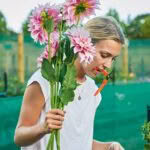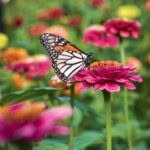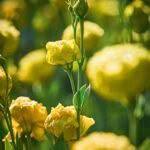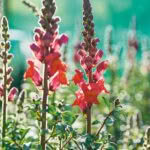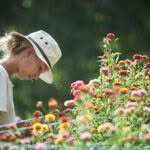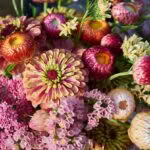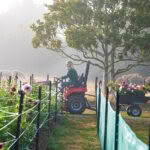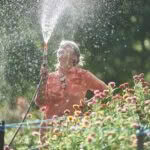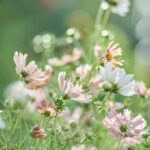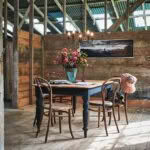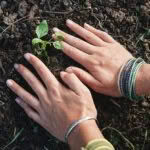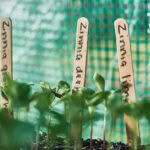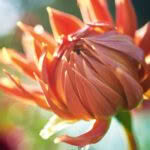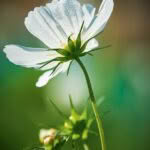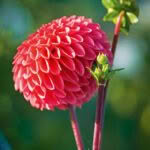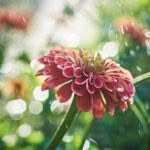Slow flowers in Ahuroa Valley: How Aila Morgan Guthrie grew a seasonal-flower business from the ground up
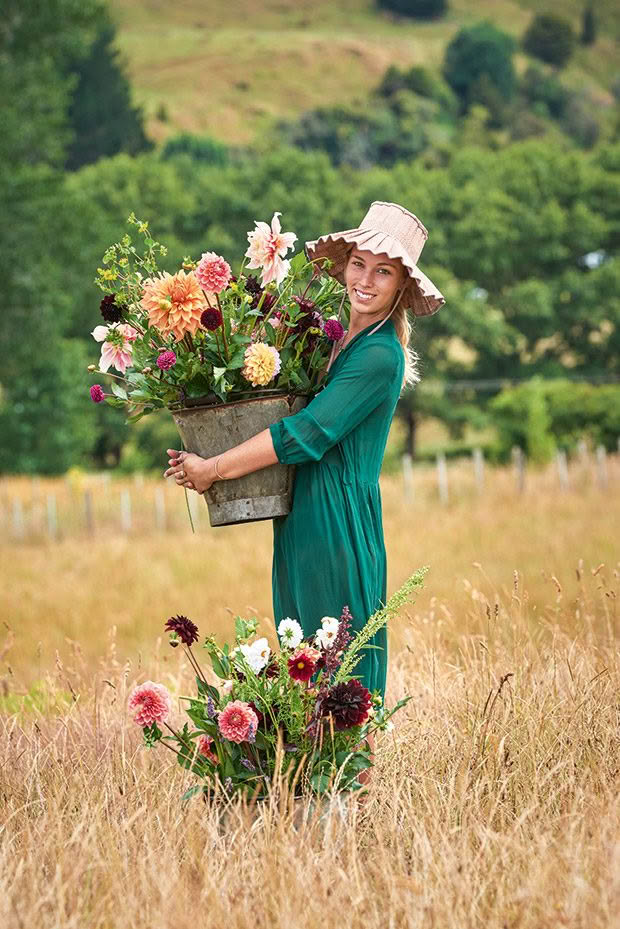
A psychology student’s budding business, providing solace when she most needed it, is rooted in the belief that homegrown flowers can heal the mind, body and soul.
Words: Cari Johnson Photos: Alistair Guthrie
Tucked into brown envelopes beneath Aila Morgan Guthrie’s bed are the seeds she will sow in the coming months and years, all neatly arranged and labeled. Aila, 20, has big plans for her little darlings.
The only (slight) challenge is finding room for the cosmos, poppies and zinnias that will inevitably expand her 400-square-metre flower garden by another row or two. And the dahlia tubers drying in the shed? Don’t get her started.
This young woman, born in Auckland, felt the call of wide-open skies long before seeds were tumbling from her pockets. As a young girl, she was perfectly content to watch the sprouts in her child-sized veggie patch grow at a snail’s pace. If only the carrots and tomatoes would grow a teeny bit faster so she could give her rescued guinea pigs a homegrown snack. “Mama,” the little girl pronounced one day. “I’m happiest with my hands in the dirt.”
- Dahlia ‘Café Au Lait’.
- A monarch butterfly rests on a zinnia ‘Queen Red Lime’.
- Green lisianthus.
- Snapdragon ‘Maryland Dark Orange’.
But it was a love of horseback riding that took her to the rural outskirts of west Auckland each week as a child; as a teenager, she show-jumped competitively.
Everything was looking pretty spectacular for the 16-year-old, when her parents chanced upon a historic (and horse-friendly) homestead for sale in the Ahuroa Valley, 50 minutes north of Auckland. Until — a week after the family settled on their new property — it wasn’t.
No one knew what was wrong when Aila began suffering from sinus infections. Sixteen, in fact, in a single year. The Guthries were knee-deep in renovations and building a stable when her mysterious ailment became even more distressing.
- The 120-year-old homestead, now on a 4.5-hectare lifestyle block, was originally built on a sprawling 4000-hectare chunk of land. In the 18th century, it was considered one of the largest farms in Northland.
- The balloon-back chairs and dining room table, as well as many household treasures in the Guthrie homestead, were purchased at various Cordy’s antique auctions.
- Aila’s pursuit of psychology stems from when she saw a health psychologist to help her cope with physical-health issues. The psychologist’s sterile white room, says Aila, had the opposite effect. “The system is really dated. I want teenagers to feel as if they’re in a comfortable space, and I think an outdoor environment is a perfect place to do that”
Aila began to faint. Inconclusive blood tests, CAT scans, sinus surgery, and a few head-scratching moments later, a cardiologist diagnosed her with autonomic dysfunction, a condition that indicates damage to the autonomic nervous system. Her dream to gallop into a free-range life with her horse Max came to a halt.
Says Aila: “It was like I didn’t know my body anymore. All the automatic things a body normally does were no longer working. I couldn’t regulate my breathing, my core temperature, my digestion, swallowing and blood pressure. I became so deconditioned that I could no longer go to school or ride my horse.
“The cardiologist said there was no cure, that I needed to build up my strength and undergo an intense physiotherapy rehabilitation programme. That year I sold my horse. It was too painful knowing I couldn’t ride him because I was no longer physically strong enough.”
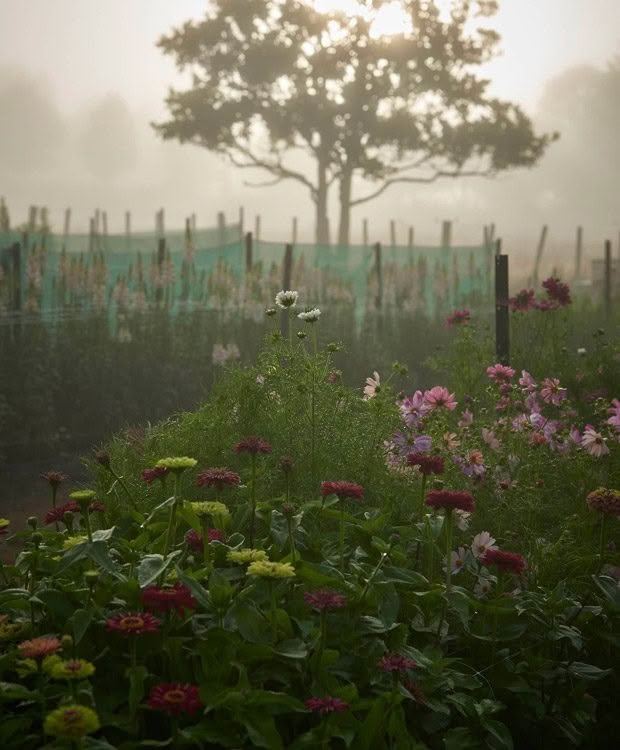
Today, Aila wanders through a flower garden with little resemblance to its days as a horse paddock. Bumblebees nap in the dahlias as she snips her way through the rows. It was dahlias that drew this slip of a young woman into the garden once again.
In 2017, intense physiotherapy was prescribed; Aila prescribed for herself evenings in the flower garden her mum had built for her, no matter how arduous those 30 steps were to take. “I wasn’t missing out. I once felt more comfortable on a horse than on my own two feet. With that taken away, I needed something to centre myself,” she says.
This determination carried on into young adulthood. After considerable progress with physiotherapy, Aila marched up to Mahurangi College for her final year of high school — no first-day jitters here. She made friends and loved her new country life until another symptom rudely interrupted the year that was supposed to be normal.
This time her joints began to pop, click and sometimes dislocate. A rheumatologist concluded she had Ehlers-Danlos, a genetic disorder that went undetected until symptoms (such as autonomic dysfunction) flared up in her teenage years.
“Suddenly at physio, the weights came down, and I couldn’t run anymore. I had to get injections that formed scar tissue around my joints. But as horrible as they were, they worked,” says Aila.
On her 18th birthday, Aila walked into the private dining room at Auckland’s Orphan’s Kitchen to find everyone — from her doctor and physiologists to her former deputy principal — raising a glass to the girl who refused to let anything get in the way of life.
- Aila’s original flower garden has grown tenfold over the past few years. The former showjumper sold her horse float for the capital to transform an unused paddock into 13 rows of flowers for her business, Hands in the Dirt.
- She and her mum Astrud often rise before the crack of dawn to harvest flowers while they are still cool and crisp.
Persistence is also a key ingredient for a bountiful garden. While coping with her condition, Aila was unintentionally growing a small-scale flower farm. It began with four rows of dahlia tubers and a few watermelon seedlings. The following year she doubled the plot: four additional rows, 20 watermelon plants.
At this rate, it wasn’t a surprise when Aila declared that dahlias (as well as other annuals) would take over an entire paddock. She left enough room for 95 watermelon plants. “Watermelons were coming out of our ears,” says Aila. “We couldn’t open the car door without a few tumbling out.”
Their bounty had become too bountiful. The Guthries gave away flowers and watermelons until, one day in Matakana, Aila and her mum took a bucket of dahlias to a florist and walked out with $40 in pocket money. And thus, the idea for her cut-flower business, Hands in the Dirt, was born.
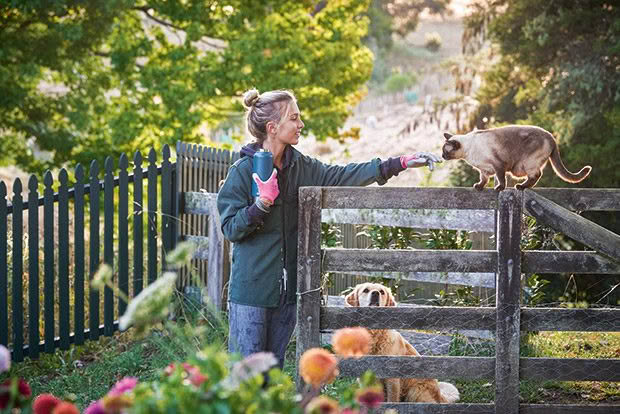
Golden retriever Tovi and burmese-burmilla Hugo have assumed the critical role of giving Aila an excuse for a quick break. Her animals, not dissimilar to the guinea pigs that roamed her garden when she was a child, are only ever a few strides away from the action.
It turns out that a bucket of seasonal flowers is as contagious as it is joyous. The concept of sustainably grown flowers quickly gained momentum in the Auckland region, first by word of mouth and then, in 2020, on Instagram.
One year into selling full time, she and her parents, who help harvest and deliver, are still pinching themselves. In her third year of studying psychology at Massey University, Aila shifted to distance learning last year to keep up with the demands of her growing business.
And demand it does. Between succession plantings and harvesting three or four times a week, it’s not uncommon for Aila to have her hands in the dirt from dawn to dusk. There have been physical hurdles along the way, but not from the hard graft, as one might expect.
- In the late 19th century, the renovated barn, now used for flower arrangements, once housed seven horse stalls. Guests arriving by horse and carriage were dropped off at the house before the clydesdales were taken to the barn.
- An antique pedal cart from Bryan Jackson Museum in Devonport.
- The chandelier in the furnished part of the barn offers a touch of ambience for morning teas and dinner parties over the winter months.
- The worn knife unearthed from beneath the barn is now used to cut paper for bouquets.
In 2019, she was hospitalized with a prolapsed disc, a painful symptom of her condition that occurred three more times that year. Still, Aila counts herself lucky. “I can manage physically,” she says. “I choose to focus on what’s positive.” Similar to her flowers, there’s authenticity in the imperfections.
A slight bend of a snapdragon stem or the odd variegated petal are embraced here in the Ahuroa Valley, where dahlias, cosmos and bells of ireland (among other annuals) are only grown in the season they naturally flourish.
“Flowers were once seen as something pure. While we still say they are pure, they aren’t really anymore because of how unsustainable they’ve become. When I started growing them myself, I realized how wildly unhealthy the floral world is. I’m trying to create a space where flowers are pure again,” she says.
- Aila lets a few flowers from each variety go to seed each season, carefully selecting those with the best colour and shape to guarantee a healthy crop the following year. Growing her seed collection involves scouring seed catalogues and placing between 10 to 15 bulk orders a year.
- Most of the seeds come from overseas retailers, Egmont Seed Company and Emerden, a small-scale flower farm in Tikorangi. Each year, seeds are germinated by the thousands between wholesale seedling grower Ngā Rākau Nurseries and Aila’s on-site 5 x 3-metre plastic tunnel house.
Aila is a champion of the slow-flower movement. Using sustainable principles means the land and the pollinators do most of the heavy lifting. Aila cares for the soil as if it were a child, putting each flower bed to rest between plantings with a thick blanket of compost, organic fertilizer, cover crops, sheep manure, and soil drenches. No chemical sprays, little plastic.
Flowers harvested at sunrise are carefully packed into her trusty Volvo to be delivered to offices, parties, friends and partners in central Auckland — as well as her retail merchant, Tessuti in Herne Bay — by the afternoon.
“I’m not churning flowers out; there are love, emotions and feelings that come with each bunch,” she says. It’s perhaps a fitting vocation for someone studying the inner workings of the human mind.
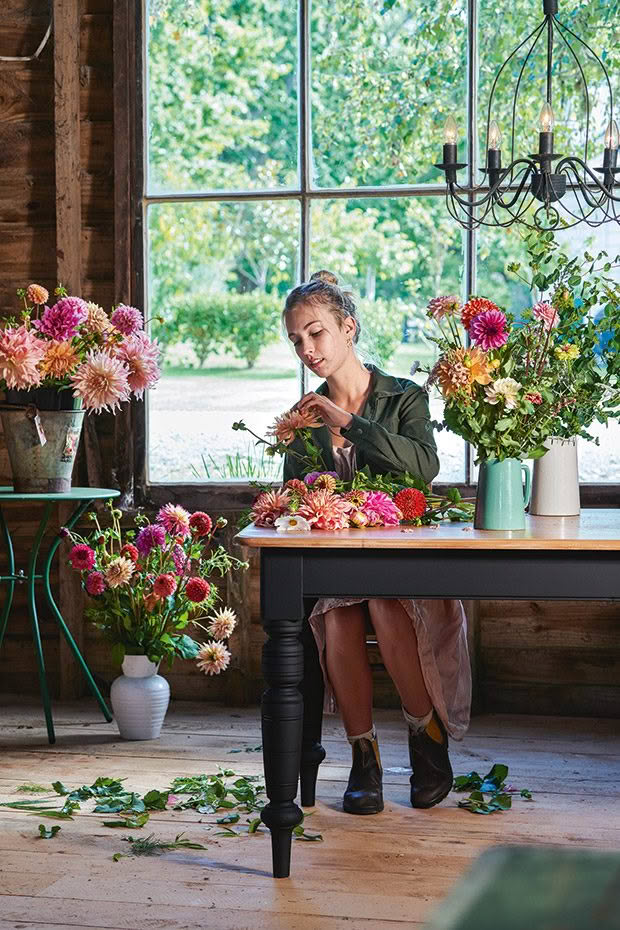
Aila taught herself how to wrap and arrange flowers after requests for bouquets came flooding in. The number of stems in each bouquet is approximate, based on the fullness of the arrangement. A bouquet is complete once the burgeoning flower bundle can no longer be held in one hand.
With plans to specialize in neuropsychology, Aila hopes to integrate her future practice with the flower farm’s positive effects. “I would love for young teens to be able to come here to take their mind off everything. I swear living in this environment helped me get better,” she says. “The beauty of growing seasonal flowers is that it changes every day. I can’t think of anything better.”
STEADY DOES IT
Aila Morgan Guthrie wants to produce flowers as sustainably as possible. This means her cut-flower business, Hands in the Dirt, only delivers seasonal blooms to the central Auckland region.
- Dahlia ‘Hamari Gold’.
- Cosmos ‘Fizzy White’.
- Dahlia ‘Jomanda’.
- Zinnia ‘Queen Red Lime’.
Without chemicals or refrigeration to help keep cut flowers fresh, Aila avoids flowers that will require any chemical intervention to flourish. Flowers vary depending on the day, week or season — and that’s half the fun.
“They never feel repetitive. I may get five different colours on one flower plant and have no idea how it happened. It feels like my flowers all have big personalities,” she says. The small operation is a team effort; customers will often find one of Aila’s parents, Astrud and Alistair, greeting them at the doorstep.
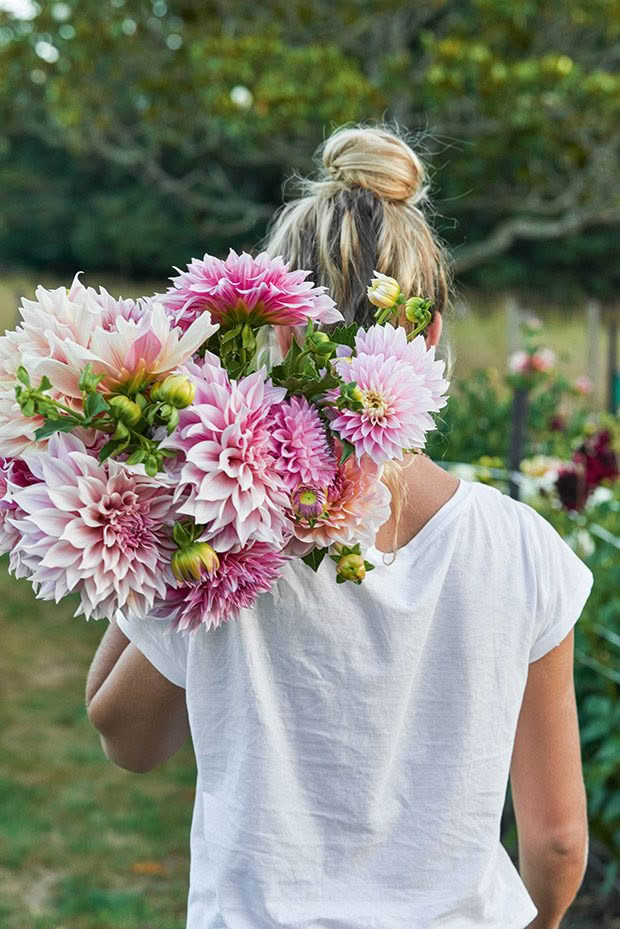
Aila is never far from fresh air and believes there are mental-health benefits to spending time outdoors.
Flowers are available in either bouquets or nine-litre buckets, a concept that came about after Aila saw how much joy people got from the wide-range of blooms. “Buckets give people the opportunity to share their flowers with others and build their own creation,” says Aila.
AILA’S TIPS FOR A CUTTING GARDEN
Nourish your soil. “People often ask how I grow healthy flowers naturally. We prepare from the front end, which is the soil. We try to make that soil as healthy as possible before we plant anything into it, so we don’t have to deal with as many pests or diseases later on.”
Plant in succession. Aila learned the hard way that annual flowers, such as dahlias and cosmos, will only last so long before they wither away. “We have to plant multiple successions of seedlings at least three times to keep a healthy cycle going,” she says.
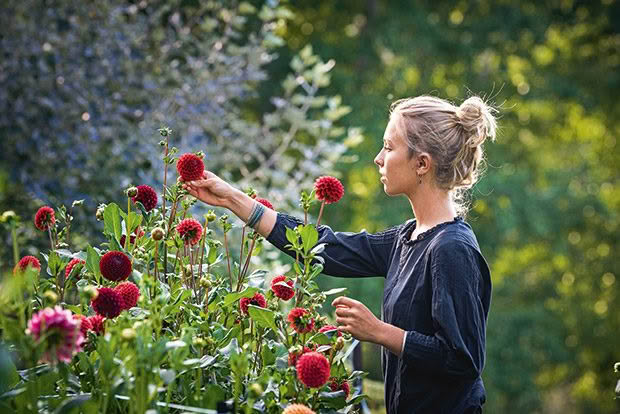
Cut low and hard. It may be tempting to preserve unopened buds on the stem by cutting close to the flower. This is a common misconception that will result in increasingly shorter stems at the top of the plant. Cut a stem low and just above the leaf nodes and side buds.
Store cut flowers properly. Keep freshly cut flowers away from fruit. The ethanol emitted from ripening fruit will cause blooms to age prematurely.
Love this story? Subscribe now!
 This article first appeared in NZ Life & Leisure Magazine.
This article first appeared in NZ Life & Leisure Magazine.
